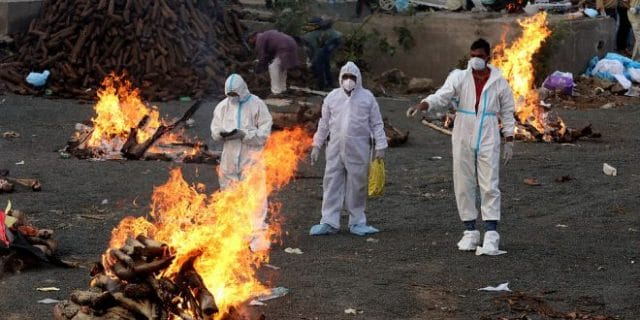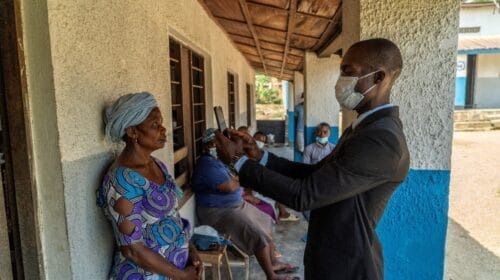How a religious festival attended by millions helped spread covid-19 in India

Relatives wearing personal protective equipment (PPE) walk amid burning funeral pyres as they perform last rites for covid-19 victims in Bhopal
Spread the love
When the pilgrims returned to their homes across the country, some brought the virus with them.
The precise role of the Hindu religious festival — the Kumbh Mela — in India’s raging outbreak is impossible to know in the absence of contact tracing. But the event was one source of infections as cases skyrocketed, according to local officials, religious leaders, and media reports.
More than 414,000 new cases were reported in India on Friday, a global record. About 4,000 people are dying a day, but such figures are an undercount. Experts believe the number of fatalities will rise in the coming days since deaths from covid-19 lag behind new cases.
Dozens of nations, including the United States, have sent aid to India as it combats a surge that has overwhelmed hospitals and led to shortages of oxygen. Several Indian cities and states have announced lockdowns to stem the spread of infections.
The combination of an enormous wave of coronavirus cases and one of the biggest mass gatherings on the planet has fueled criticism that India’s government should have curtailed the religious event or canceled it altogether. Last year, when India had just several hundred coronavirus cases, the government swiftly imposed a nationwide lockdown.
The Kumbh Mela “may end up being the biggest superspreader in the history of this pandemic,” said Ashish Jha, dean of the School of Public Health at Brown University, in a recent interview with Indian news outlet The Wire. “It brought so many people together from across India.”
The Kumbh Mela — named after a vessel containing divine nectar — is a vast festival that rotates among four locations, drawing multitudes of Hindu ascetics, ordinary devotees, celebrities, tourists and even royalty. A quirk of the astrological calendar dictated that the ritual in the north Indian city of Haridwar would be held in 2021, a year earlier than normal.
Ahead of this year’s festival, India’s health ministry said that state authorities were not conducting an adequate number of tests and warned of a “potential upsurge” in cases. Pilgrims were obliged to present a negative coronavirus test, wear masks and observe social distancing, but reports indicated that such requirements were flouted.
Tirath Singh Rawat, the leader of the state where the Kumbh Mela took place and a member of the ruling Hindu nationalist Bharatiya Janata Party, urged devotees from all over the world to attend. “Nobody will be stopped in the name of covid-19,” he said in March. “We are sure the faith in God will overcome the fear of the virus.”
That evening the 49-year-old came down with a fever. Two days later, he and a friend boarded an overnight train home, where he tested positive for coronavirus, said Lekhraj Sharma, the coordinator for the temple. Tyagi was admitted to the hospital as his symptoms worsened, and he died on April 29.
Sharma said that the friend who had traveled with Tyagi on the train from the Kumbh Mela tested negative, but he wasn’t sure about the rest of their group. He said the attendees went straight to their villages after coming back from the gathering at the end of April.
Sixty cases “is significant for a small place like ours,” Zaidi said. “I think we could have been in a much better position right now.”
In Ahmedabad, a city in the western state of Gujarat, many pilgrims returned from the festival on trains. In one batch of travelers, about 10 percent of those tested came back positive for coronavirus, said Bhavin Solanki, a municipal medical health officer. They were sent to institutional quarantine. Officials in the eastern state of Odisha and the northeastern state of Assam also confirmed that people returning from Haridwar had tested positive for the virus.
A famous Bollywood music composer tested positive for the virus a few days after returning to Mumbai from the religious festival, his son told the Indian Express newspaper. The 66-year-old died in late April. The former king and queen of Nepal also tested positive after attending the gathering, the Himalayan Times reported.
On April 17 — after two of the main rituals had concluded — Prime Minister Narendra Modi appealed to devotees to observe the rest of the festival in a “symbolic” manner to “give strength to India’s fight against the virus.”
Modi’s soft-touch approach stood in stark contrast to his government’s actions at the start of the pandemic last year. When a gathering of a Muslim missionary group in Delhi emerged as a superspreader event, authorities shut down its headquarters and detained thousands of its members — some of them for months — on charges that courts later called spurious.
The Kumbh Mela was by far the biggest of many large gatherings that went ahead in different parts of India over the course of April, including election rallies, sports events, and weddings.
Unlike political rallies, the Kumbh Mela drew people from every corner of the country, John said, allowing variants prevalent in one region to jump to different geographies. For instance, the variant first identified in the United Kingdom appears to be fueling infections in parts of north India, while the so-called Indian variant is more common in the western part of the country.
The infections also spread among the attendees, including the members of the akharas, or religious sects, that spearheaded the event. Ravindra Puri, the secretary of the Niranjani Akhara, said that nine of the ascetics in his organization, all of them elderly, died after contracting covid-19. On April 15, the group announced that it was withdrawing from the gathering.
“Covid will come and go,” he said. “A festival for the gods cannot be stopped.”
Shams Irfan in Srinagar and Taniya Dutta in New Delhi contributed reporting.





